Pew Research Center
October 26, 2006
Summary of Findings
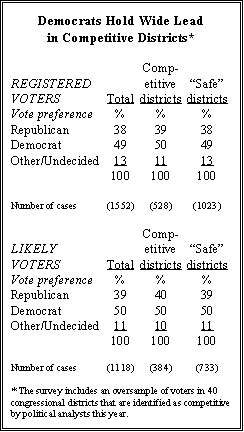 With less than two weeks to go before the midterm elections, the
Democrats not only continue to maintain a double-digit advantage nationally,
but also lead by the same margin in the competitive districts that will
determine which party controls the House of Representatives. Nationally, the
Democrats hold a 49%-38% lead among registered voters, and a nearly identical
50%-39% lead among those voters most likely to cast ballots on Nov. 7.
With less than two weeks to go before the midterm elections, the
Democrats not only continue to maintain a double-digit advantage nationally,
but also lead by the same margin in the competitive districts that will
determine which party controls the House of Representatives. Nationally, the
Democrats hold a 49%-38% lead among registered voters, and a nearly identical
50%-39% lead among those voters most likely to cast ballots on Nov. 7.
An oversample of voters in 40 competitive districts identified by a consensus of political analysts shows that voting intentions in the battleground districts are about the same as they are in the "safe" House districts. Among registered voters, the Democrats lead by 11 points in competitive districts (50%-39%) and by the same margin in safe districts (49%-38%).
The latest national survey by the Pew Research Center for the People & the Press, conducted among 1,552 registered voters - including 528 who reside in competitive districts - shows that Iraq continues to be the dominant issue for voters. More than four-in-ten voters (45%) view the situation in Iraq as the most important, or second most important issue in their vote, the highest percentage for six issues tested. In competitive districts, slightly more (50%) cite Iraq as a top issue in their vote.
Public views of Iraq continue to be overwhelmingly negative, with a solid majority of Americans (59%) saying the U.S. military effort there is not going well. Republicans, who have been steadfast backers of the war, are now rendering more negative judgments about how things are going in Iraq.
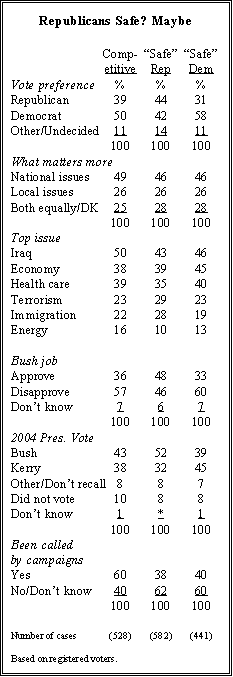 The new poll finds no increase in public optimism about the nation's
economy, despite gains in the stock market and lower gas prices. Just
one-in-three Americans say the national economy is in excellent or good shape,
while nearly twice as many (65%) view the economy as only fair or poor.
Opinions about economic conditions are especially negative in the Midwest.
Democrats and independents offer much gloomier assessments of the nation's
economy, and their own financial condition, than do Republicans.
The new poll finds no increase in public optimism about the nation's
economy, despite gains in the stock market and lower gas prices. Just
one-in-three Americans say the national economy is in excellent or good shape,
while nearly twice as many (65%) view the economy as only fair or poor.
Opinions about economic conditions are especially negative in the Midwest.
Democrats and independents offer much gloomier assessments of the nation's
economy, and their own financial condition, than do Republicans.
The Democratic Party's advantage in handling most issues remains stable. The GOP continues to be viewed as better able to deal with terrorism but its lead has declined from 16 points in February to six points currently. However, the GOP has drawn even with the Democrats in perceptions of which party can better handle immigration, after trailing by as much as 16 points in the spring.
Notably, public impressions of the Democratic Party have improved since the summer. Currently, 53% express a favorable opinion of the Democratic Party, up from 47% in July. Just 41% have a positive opinion of the Republican Party, which is virtually unchanged from April and July (40% on both occasions).
Competitiveness in Republican Districts
With opinions of Congress growing increasingly negative, even safe Republican districts have been affected. In these districts, which voted heavily in favor of President Bush two years ago, 44% of registered voters say they plan to vote for the Republican candidate compared with 42% who favor the Democrat. By contrast, the survey suggests that Democrats in districts regarded as safe are just that 58% of voters in safe Democratic districts say they would vote for the Democratic candidate while just 31% intend to vote Republican.
The competitive House districts were identified using rankings from early to mid-October in Congressional Quarterly, The Cook Political Report, The Rothenberg Political Report, The New York Times, and Larry Sabato's Crystal Ball. Most of the districts are in the Midwest and Northeast; four of the districts are in Pennsylvania, with three each in Connecticut, Indiana, New York and Ohio. Of the 40 districts selected, 34 are Republican-held (24 GOP incumbents and 10 open seats), while six are currently Democratic (five incumbents and one open seat).
As a group, voters in these districts say they voted for President Bush by a 43%-38% margin in 2004. But today, 57% of voters in competitive districts disapprove of Bush's job performance, which is comparable to the percentage disapproving in the safe Democratic districts (60%). Bush's overall rating is higher in safe Republican districts than elsewhere (48%).
About half of voters in competitive, safe Republican, and safe Democratic districts say that national issues matter more to their vote for Congress than do local issues. Iraq is clearly the top issue in competitive districts; by comparison, nearly as many voters in safe Democratic districts rate the economy (45%) as the top issue in their vote as cite the war (46%). Iraq is the top issue in safe Republican districts, but terrorism and immigration rate higher in these districts than elsewhere.
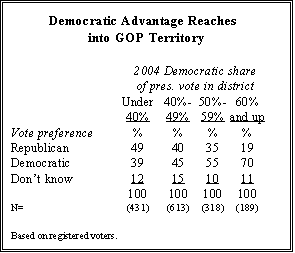 As expected, many more voters in competitive districts than in safe
districts for either party say they have been called by candidates or political
groups during the past few months. Fully 60% of voters in competitive districts
say they have been called by a campaign or political organization, far more
than in safe districts. However, campaign commercials are nearly as commonplace
in safe districts as in competitive ones, with roughly nine-in-ten in each
saying they have seen or heard commercials for candidates running for
office.
As expected, many more voters in competitive districts than in safe
districts for either party say they have been called by candidates or political
groups during the past few months. Fully 60% of voters in competitive districts
say they have been called by a campaign or political organization, far more
than in safe districts. However, campaign commercials are nearly as commonplace
in safe districts as in competitive ones, with roughly nine-in-ten in each
saying they have seen or heard commercials for candidates running for
office.
Another way to view the relative standing of the two parties as the midterms approach is to sort the survey respondents according to how their congressional districts voted in the 2004 presidential election. In very strong Republican districts the 125 districts where John Kerry got less than 40% of the vote in 2004 voters are favoring the Republican House candidate over the Democrat by a margin of 49% to 39%. But there is a slight Democratic advantage in voting intention in the somewhat larger group of 131 districts where Kerry received between 40% to 49% of the vote in 2004: 45% of respondents in these districts say they will vote Democratic in the House race, compared with 40% saying they will vote Republican. Among respondents in the 179 districts where Kerry received half or more of the votes, the Democratic House candidate has a wide lead.
Shifts Since '02
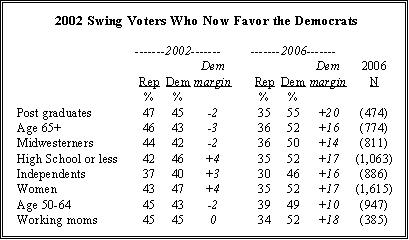 The nation's political landscape has changed dramatically since the
fall of 2002, prior to that year's midterm elections when the Republican Party
gained seven House seats.
The nation's political landscape has changed dramatically since the
fall of 2002, prior to that year's midterm elections when the Republican Party
gained seven House seats.
Many of the voter groups that were fairly evenly divided between the Republican and Democratic parties at that time have swung decisively in favor of the Democrats, according to an analysis of survey data from two polls conducted this month and three pre-election surveys from 2002. (For detailed demographic tables comparing the 2002 and 2006 midterms, see pg. 16).
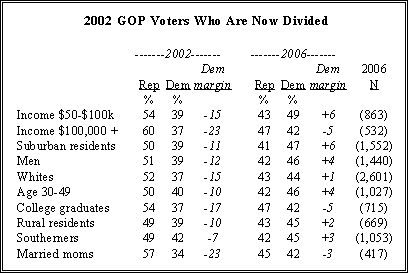 The voter groups that were divided in 2002 but now favor Democrats
include independents, women and working moms. The latter group was split in its
voter preferences in the fall of 2002 (45%-45%); today, 52% say they will vote
for the Democratic candidate in their district, while 34% favor the
Republican.
The voter groups that were divided in 2002 but now favor Democrats
include independents, women and working moms. The latter group was split in its
voter preferences in the fall of 2002 (45%-45%); today, 52% say they will vote
for the Democratic candidate in their district, while 34% favor the
Republican.
Similarly, other key voter groups that favored the Republican candidate by large margins four years ago are much more divided today. These include men, who backed the Republican candidate by 12 points four years ago and now narrowly favor the Democrat in their district (by four points), and whites, who also preferred the GOP candidate by 15 points but are now divided (44% Democrat-43% Republican). However, among these groups the biggest shift has occurred among married mothers: In the fall of 2002, married mothers favored the Republican candidate in their district by 57%-34%; today they support the Republican by just three points.
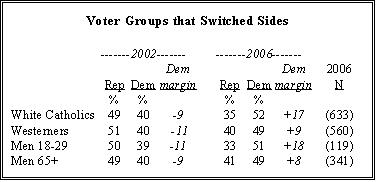 In addition, some groups of voters that favored the GOP candidate by
substantial margins in 2002 now support the Democrat in their district by
comparable, or in some cases greater, margins. White Catholics were solidly in
the GOP's camp in 2002, but now support the Democratic candidate by
52%-35%.
In addition, some groups of voters that favored the GOP candidate by
substantial margins in 2002 now support the Democrat in their district by
comparable, or in some cases greater, margins. White Catholics were solidly in
the GOP's camp in 2002, but now support the Democratic candidate by
52%-35%.
Independents Moving
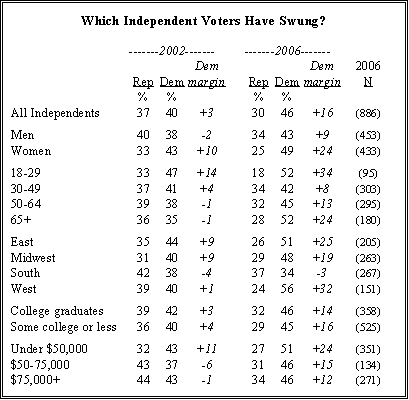 Independents now support the Democratic candidate in their district
by 16 points; four years ago, Democrats led among independent voters by just
three points.
Independents now support the Democratic candidate in their district
by 16 points; four years ago, Democrats led among independent voters by just
three points.
The analysis shows that much of the change among independents has occurred among voters under age 30 and those ages 65 and older. Independents under the age of 30 decisively favored the Democratic candidate in 2002, and the margin has more than doubled (from 14 points in 2002 to 34 points currently). By contrast, independents ages 65 and older were narrowly divided in their voter preference four years ago, but now heavily favor the Democrat (by 52%-28%).
Views of Congress Fall Further
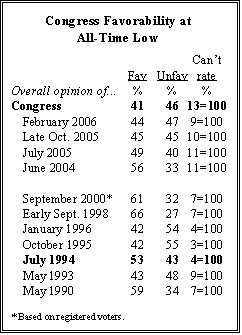 Just 41% of Americans express a favorable opinion of Congress, while
46% have an unfavorable view. Opinions of Congress as an institution have
fallen steadily over the past two years, from 56% favorable in June 2004.
Favorable views of Congress are now at their lowest level ever in a Pew survey;
however, unfavorable opinions were significantly higher at around the time of
the government shutdown in late 1995 and early 1996 (55% unfavorable in October
1995).
Just 41% of Americans express a favorable opinion of Congress, while
46% have an unfavorable view. Opinions of Congress as an institution have
fallen steadily over the past two years, from 56% favorable in June 2004.
Favorable views of Congress are now at their lowest level ever in a Pew survey;
however, unfavorable opinions were significantly higher at around the time of
the government shutdown in late 1995 and early 1996 (55% unfavorable in October
1995).
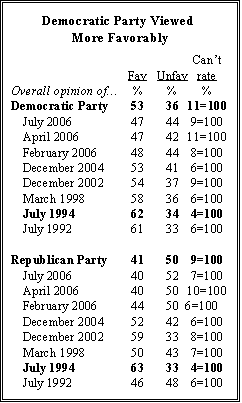 Since the summer, the Democratic Party's image has improved
modestly. Currently, 53% say they have a favorable opinion of the party,
compared with 36% who have an unfavorable view. In July, impressions of the
Democratic Party were more evenly divided (47% favorable/44% unfavorable).
Since the summer, the Democratic Party's image has improved
modestly. Currently, 53% say they have a favorable opinion of the party,
compared with 36% who have an unfavorable view. In July, impressions of the
Democratic Party were more evenly divided (47% favorable/44% unfavorable).
By contrast, opinions of the Republican Party have remained more stable. In the current survey, 41% say they have a favorable opinion of the Republican Party, which is virtually unchanged from July (40%) and April (40%). The gap in positive opinions of the two parties 12 points is larger than at any point since February 1999, during the impeachment of former President Clinton (14 points)
Both political parties are viewed much less favorably than they were in July 1994, a few months before the Republicans won control of Congress. At that time, positive opinions of both parties were in the low 60s (63% Republican Party, 62% Democratic Party). Opinions of Congress are also less favorable than they were then (53% vs. 41% today).<'p>
Terrorism Remains GOP's Strongest Issue
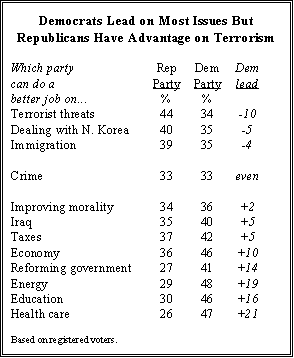 Dealing with terrorism continues to be the strongest issue for the
Republican Party; by a 10-point margin (44%-34%), registered voters believe
Republicans are better able to deal with the terrorist threat at home. The GOP
also has the advantage in dealing with North Korea, and a narrower edge on
immigration, while it is tied with Democratic Party as the party better able to
reduce crime.
Dealing with terrorism continues to be the strongest issue for the
Republican Party; by a 10-point margin (44%-34%), registered voters believe
Republicans are better able to deal with the terrorist threat at home. The GOP
also has the advantage in dealing with North Korea, and a narrower edge on
immigration, while it is tied with Democratic Party as the party better able to
reduce crime.
Of the eight other issues tested, the Democrats hold statistically significant leads on seven, including a five-point lead as the party better able to make wise decisions about what to do in Iraq. The Democrats lead by more sizable margins on dealing with the economy, reforming government, tackling energy issues, improving the educational system, and improving health care.
Views about which party can better handle these issues have changed little in recent weeks. The scandal surrounding Republican Congressman Mark Foley, who has admitted to sending sexuality explicit emails and instant messages to congressional pages, has not changed voter perceptions about which party would do a better job of improving morality in the country. In early September, shortly before the Foley story broke, registered voters leaned toward the Democrats on this issue by a 37%-33% margin. In the wake of the scandal, these numbers are virtually unchanged: 36% prefer the Democrats, 34% the Republicans.
The perception that Democrats are better positioned to reform the government in Washington is particularly common among two crucial swing vote constituencies: voters in competitive House districts and independents. Nationwide, registered voters give the Democrats a 14-point advantage on this issue (41%-27%), but voters in competitive districts favor the Democrats on government reform by an even larger 22-point margin (44%-22%). Meanwhile, registered independents are also particularly likely to say the Democrats are best able to handle reforming the government Washington (by 43%-15%).
Conflicting Concerns
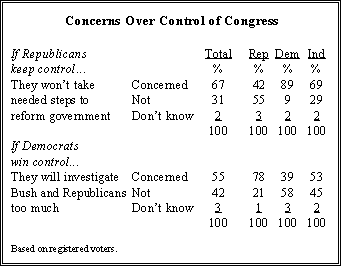 Misgivings about the ability of Republicans to reform government are
a voter concern: Two-thirds say they are either very (36%) or fairly (31%)
concerned that if Republicans keep control of Congress they will not take the
needed steps to reform government. Importantly, this concern is widespread
among independent voters (34% very concerned, 35% fairly concerned).
Misgivings about the ability of Republicans to reform government are
a voter concern: Two-thirds say they are either very (36%) or fairly (31%)
concerned that if Republicans keep control of Congress they will not take the
needed steps to reform government. Importantly, this concern is widespread
among independent voters (34% very concerned, 35% fairly concerned).
>Voters also worry that if Democrats gain control of Congress, they will launch too many investigations of President Bush and the Republicans. But fewer voters express this concern than worry that the Republicans will fail to reform government (55% vs. 67%).
On foreign policy, voters also are more worried about the direction Republicans would take the country than they are about the Democratic approach to international issues. Nearly two-in-three voters (65%) are concerned (and 43% are very concerned) that if Republicans maintain control they will get the country involved in too many overseas military operations. These fears are shared by a two-thirds majority of independents (45% very, 21% fairly).
Although a potential Democratic majority arouses less concern, about half of registered voters (51%) nonetheless say they are either very (30%) or fairly (21%) concerned that if Democrats win control they will weaken the country's anti-terrorism efforts. This includes roughly half of independent voters (27% very, 22% fairly).
Bush Approval Steady
Approval ratings for President Bush have remained basically unchanged since June of this year. Currently, 38% of the general public approves of the way Bush is handling his job as president, while 53% disapprove. Views of the President are similar among registered voters: 41% approve, 53% disapprove. In competitive districts, however, registered voters take a somewhat more negative view; in these 40 House districts, 36% give Bush positive marks, while 57% give him negative reviews. Registered independents also take a dim view of the President's job performance - only 33% approve, while 56% disapprove.
Money in Politics; Photo ID for Voters
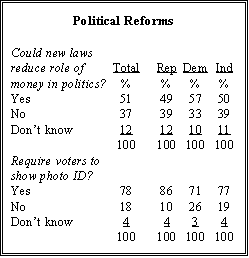 With 2006 shaping up to be the most expensive mid-term election in
the nation's history, the role of money is once again a topic of discussion.
When asked if new laws could be written that would be effective in reducing the
role of money in politics, about half (51%) of the public says yes; 37% do not
think any new laws could be effective. Democrats are more apt than Republicans
or independents to think new laws could reduce the role of money in
politics.
With 2006 shaping up to be the most expensive mid-term election in
the nation's history, the role of money is once again a topic of discussion.
When asked if new laws could be written that would be effective in reducing the
role of money in politics, about half (51%) of the public says yes; 37% do not
think any new laws could be effective. Democrats are more apt than Republicans
or independents to think new laws could reduce the role of money in
politics.
Compared with a decade ago, fewer people today believe that laws could be effective. In 1997, 62% thought the role of money in politics could be reduced.
Another policy debate that has attracted attention this year is the move by some states as well as Republicans in the U.S. House to require voters to produce an official photo identification at the polls before being allowed to vote. A large majority of the poll's respondents (78%) support such a requirement; just 18% say they oppose it. Democrats are less supportive of this proposal than are Republicans, and this is especially true among liberal Democrats, 36% of whom are opposed. But even in this group, 60% favor it.
Iraq Trends More Negative
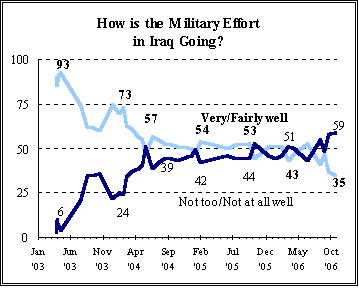 Amid increased violence and mounting casualties in Iraq, opinions
about the war have changed only marginally over the past several weeks. Since
early September, however, opinions on several key measures on the war have
grown more negative. Just 43% of Americans now believe the U.S. made the right
decision in using military force against Iraq, down from 49% in early
September. And the number saying the U.S. military effort is not going well has
risen from 48% in early September to 59% in the current survey.
Amid increased violence and mounting casualties in Iraq, opinions
about the war have changed only marginally over the past several weeks. Since
early September, however, opinions on several key measures on the war have
grown more negative. Just 43% of Americans now believe the U.S. made the right
decision in using military force against Iraq, down from 49% in early
September. And the number saying the U.S. military effort is not going well has
risen from 48% in early September to 59% in the current survey.
Even so, the public remains divided over whether U.S. troops should stay in Iraq until the situation is stabilized (46%) or come home as soon as possible (47%). Opinion has been evenly split for several months about what to do with the troops. In early September, 47% favored keeping the troops in Iraq and an identical number favored withdrawing U.S. forces as soon as possible.
Republicans Softening on the War
While views on the war continue to be strongly linked to partisanship, Republicans are becoming more negative in their assessments of the war effort and are more open to the possibility of establishing a timetable for the withdrawal of troops. However, a strong majority of Republicans (78%) continue to say that the U.S. made the right decision in using force in Iraq. Over the same period, the views of the general public have moved in the opposite direction.
Republicans' assessments of the war effort have grown more negative: 61% now say the military effort is going well, down from 72% in early September. The views of moderate Republicans have soured even more: 56% said the war effort was going well in September, compared with only 41% today. Furthermore, Republicans are more accepting of the idea of establishing a timetable for the withdrawal of U.S. troops from Iraq. Four-in-ten Republicans are now in favor of a timetable, up from 31% last month.
Republicans continue to be more divided than the Democrats over Iraq policy. While an overwhelming percentage of conservative Republicans (86%) say the U.S. made the right decision in using force in Iraq, just 59% of moderate Republicans agree. Within the Democratic party, the gap is less dramatic: 11% of liberal Democrats say the U.S. made the right decision, compared with 24% of moderate Democrats. Similarly, while 69% of conservative Republicans say the war effort is going well, only 41% of moderate Republicans agree with that assessment. Among Democrats, small minorities of both liberals (18%) and moderates (20%) agree things are going well in Iraq.
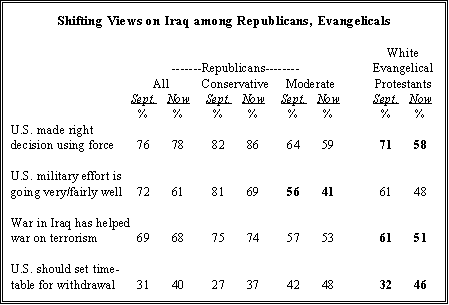 Opinion about Iraq also has shifted significantly among white
evangelical Protestants since September. Roughly six-in-ten evangelicals (58%)
now feel it was the right decision to use force in Iraq, down from 71% in early
September. In addition, white evangelicals are now much more open to the idea
of establishing a timetable for withdrawal from Iraq: 46% now say we should set
a timetable compared with 32% in September.
Opinion about Iraq also has shifted significantly among white
evangelical Protestants since September. Roughly six-in-ten evangelicals (58%)
now feel it was the right decision to use force in Iraq, down from 71% in early
September. In addition, white evangelicals are now much more open to the idea
of establishing a timetable for withdrawal from Iraq: 46% now say we should set
a timetable compared with 32% in September.
By a margin of 46%-36% the public says the war in Iraq has hurt the broader war on terrorism. The balance of opinion on this issue has shifted since the summer when more Americans believed the war in Iraq had helped the war on terrorism. The partisan gap on this issue remains substantial. Nearly seven-in-ten Republicans (68%) say the war in Iraq has helped the war on terror. A nearly equal percentage of Democrats (69%) say it has hurt U.S. efforts against terrorism. Independents are closer to Democrats on this question: 33% say the Iraq war has helped the war on terror, 50% say it has hurt.
The Economy
Despite record highs on Wall Street and falling gasoline prices, the public continues to give the national economy lukewarm ratings. Just 33% say national economic conditions are excellent or good; 65% say the economy is in only fair or poor shape. These ratings are off slightly from last month (37% excellent or good) and basically unchanged from January of this year. Men are more positive about the economy than are women, and whites have a much more positive view than do blacks. Midwesterners have a much more negative view of the economy compared with those living in other regions of the country. Only a quarter of Midwesterners give the economy an excellent or good rating, compared with roughly 35% of those living in other parts of the country.
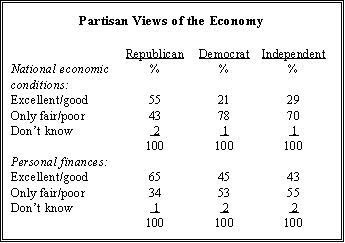 Americans offer more positive assessments of their own personal
financial situations: 49% say they are in excellent or good shape financially,
while an equal percentage says their finances are in only fair or poor shape.
Men rate their personal financial situation more positively than do women, and
whites give themselves higher ratings than do blacks. The racial gap on this
question is especially sharp: 53% of whites say they are in excellent or good
shape financially, compared with only 30% of blacks.
Americans offer more positive assessments of their own personal
financial situations: 49% say they are in excellent or good shape financially,
while an equal percentage says their finances are in only fair or poor shape.
Men rate their personal financial situation more positively than do women, and
whites give themselves higher ratings than do blacks. The racial gap on this
question is especially sharp: 53% of whites say they are in excellent or good
shape financially, compared with only 30% of blacks.
Views of both the national economy and personal financial situations are strongly linked to party identification. Republicans are more than twice as likely as Democrats to say the national economy is in excellent or good shape (55% vs. 21%, respectively). Independents are much closer to Democrats in their assessments of the national economy. A similar pattern can be seen on personal finances with Republicans feeling much more positive about their own financial situations than either Democrats or independents.
Iraq Interest Rebounds
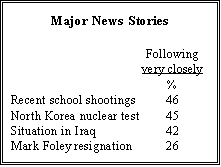 There was extensive public interest in several major stories this
month: 46% say they paid very close attention to recent school shootings in
Pennsylvania and other states, and about as many (45%) say they tracked news of
North Korea's nuclear test very closely.
There was extensive public interest in several major stories this
month: 46% say they paid very close attention to recent school shootings in
Pennsylvania and other states, and about as many (45%) say they tracked news of
North Korea's nuclear test very closely.
The rash of school shootings attracted particularly widespread interest among women, especially older women. Overall, 52% of women paid very close attention to these stories compared with 40% of men. Roughly six-in-ten women ages 50 and older (59%) tracked the school shootings very closely.
North Korea's announcement that it recently tested a nuclear weapon drew broad public interest. Identical percentages of Republicans and Democrats (49% each), but fewer independents (40%), followed this story very closely.
Roughly four-in-ten Americans say they are paying very close attention to news abut the current situation in Iraq (42%). In September, just 33% said they were tracking news from Iraq very closely, one of the lowest levels since the war began more than three years ago.
About a quarter of Americans (26%) say they very closely followed news of the resignation of former Rep. Mark Foley, who sent inappropriate messages to young people. More than a third of Democrats (35%) paid very close attention to this story, compared with just 22% of independents and 21% of Republicans.
Commentary: